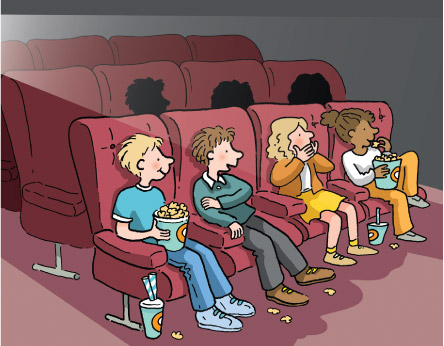Addressing the gender gap
Read this account written by Miss Fuller, the twins’ form teacher referred to in the case study. It is an example of some of the innovative work being undertaken in the twins’ primary school to address the gender gap. In year 4, children are 8 to 9 years old. Miss Fuller outlines how she sees the differences in reading in relation to Alex and Molly, who has been in Alex’s class since starting school aged 4.
Case study: Miss Fuller’s account
In the case of two typical children in my year 4 class, Molly and Alex, there are distinct differences in their attitudes towards reading and writing. Molly is an avid reader, with a natural love of books and stories. She brings her library books to school every day, changes her books regularly and independently and enjoys reading, both at home and at school. She shows an interest in her reading, chooses books that she enjoys and likes recording her thoughts and feelings on the books that she reads.
As Molly reads regularly and is enthusiastic, she drives her own love of reading. This has a positive effect on Molly’s understanding of her reading, as she thinks carefully about the stories she reads and reflects on her own thoughts and feelings towards her reading. This also affects Molly’s writing in school, as she is full of ideas and has a good understanding of how to structure her writing in order to make it interesting.
Alex would never say reading was his favourite school activity. He often enthusiastically chooses books from the library, but quickly loses interest if the book is too long, or does not have enough pictures. Alex regularly forgets to bring his library books to school and although his mother tries to read with him at home, they struggle to maintain a reading habit. As a result Alex’s reading patterns are erratic. This becomes a vicious circle, as the less regularly Alex reads the more quickly he loses interest.
Although both children read with me and teaching assistants at school, the differences in their motivation towards reading, at home and at school, have a significant impact on their confidence in literacy and their reading and writing ability.
Various strategies have been put in place in our school in order to reduce the gap in literacy between boys and girls, and in particular to inspire boys, such as Alex, to read and write.
The main strategy that I have found successful in engaging the boys to read and to write is to give them a distinct sense of purpose in each lesson. Molly tends to work to please the teacher, whereas Alex often wonders, ‘What is the point?’ With a distinct purpose for a lesson, and when collaboration is encouraged, Alex is engaged and both children are given a real-life reason for their learning.
For example, in a recent lesson, the children were asked to read a book and write a review on the book, in order to recommend the book to a younger child. The children were told that they would actually be reading their reviews and talking about the books with a class of younger children. This inspired and motivated both Molly and Alex to choose appropriate books for the children, to read them carefully and to write careful reviews. They also enjoyed using their ICT and art skills in order to present their reviews well.
The activity was successful as Alex and Molly enjoyed it, were motivated and saw the result of their efforts when reading to the excited younger children. Without realising it, both children were also using and improving their own literacy skills. The purpose of the learning was clear to both children and was regularly touched on through ‘mini plenaries’ (a session in which the teacher summarises what they have done) in each lesson, in order to keep the children motivated and on task.
Another important element in inspiring boys is the use of good quality, yet inspiring, reading material during guided reading sessions and literacy lessons. The quality of the texts is important in order to provide good quality examples of writing, yet the subject matter also needs to grab the boys’ attention. For example, I may choose spooky stories, or action stories, especially those with a boy protagonist.
At home, boys like Alex are encouraged, initially, to read anything that they are interested in, whether it be magazines, stories, comics or instructions for games. Gradually, Alex will be encouraged to choose books from the library that interest him, such as non-fiction books about a subject of interest, such as a favourite sport.
In order to make literacy lessons themselves more interesting, I present boys with inspirational stimulus, such as film clips, in order to provide the subject matter for a lesson. Along with the inspirational texts, the boys’ attention is grabbed and maintained. Use of role play and drama activities add to the interest and help to provide motivation for boys to want to read on, to find out what happens next in the story and to want to write their own versions of scenes from the story.
For example, in a recent lesson, Alex heard part of the story Peter Pan being read to him, watched some scenes from a film version of the story and made his own Peter Pan headdress, before acting out a battle scene from the story with his friends. Following this sequence of lessons, Alex was eager to read some more of the story himself, as well as to write about the scene he had acted, both as a narrative and as a play script.
In the same sequence of lessons, Molly also benefited from and engaged with the activities. In addition, she was able to take the work in her own direction by writing about a scene in the story that interested her.
The use of film as an inspirational stimulus has been extended in our school, through a FILMCLUB, one of a network of national clubs. Many of the children, including Molly and Alex, love the club, as it gives them a chance to relax and enjoy films with their friends. But I have also noticed that the club has had a positive impact on both children’s enjoyment in reading and writing.
My colleague and I carefully choose films that interest and engage the children, but which also give them an opportunity to experience different countries, cultures, languages and perspectives on life. The children are then encouraged to read about the films they have watched and to write their own film reviews. Alex has loved reading about the films on the club’s website and has enjoyed writing his own reviews, especially as he can then see his reviews posted on the club’s website.
An important aspect of your role as a teaching assistant is to reflect on your practice and to think about what has worked well, or not so well. In this account, Miss Fuller has reflected on her practice and has identified different things that have worked well with Alex and Molly.
Activity 6
Summarise what Miss Fuller said about Alex and his reading, and about the strategies she used to encourage him.
- How does Alex’s experiences of reading compare with those of Molly?
Try to identify any differences between the two children. Also think about the similarities between the two children, such as their love of FILMCLUB.
Make some notes in the box below and then read our comments.
Comment
Alex loses interest quickly in reading. This is a vicious circle because the less he reads, the more quickly he loses interest. He is an erratic reader.
Molly is an avid reader. She is full of ideas and reads library books, which she changes frequently. She is able to structure her writing and make it interesting.
However, both children enjoyed writing a book review of something they had read to recommend to younger children and they both enjoyed FILMCLUB.
Miss Fuller has put strategies in place to encourage reading. She gives a purpose to each lesson, such as a real-life reason for their learning. The children were asked to write book reviews for younger children and this improved their own learning.
Good quality and inspiring reading materials are important to Miss Fuller. Sometimes she uses an inspirational stimulus such as a film clip.
3.1 The gender gap: fact or fiction?

